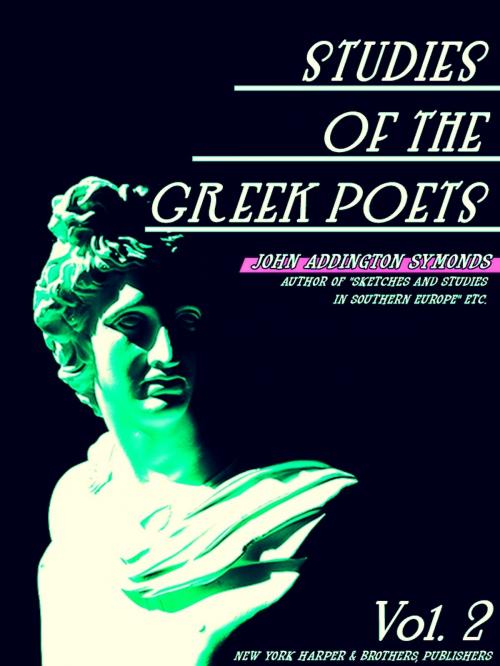Studies of the Greek Poets Volume 2 (of 2)
Fiction & Literature, Poetry, Continental European, Inspirational & Religious| Author: | John Addington Symonds | ISBN: | 1230000279636 |
| Publisher: | HARPER & BROTHERS | Publication: | November 12, 2014 |
| Imprint: | Language: | English |
| Author: | John Addington Symonds |
| ISBN: | 1230000279636 |
| Publisher: | HARPER & BROTHERS |
| Publication: | November 12, 2014 |
| Imprint: | |
| Language: | English |
Example in this ebook
CHAPTER XIV.
GREEK TRAGEDY AND EURIPIDES.
The chapters on Æschylus and Sophocles have already introduced the reader to some of the principal questions regarding Attic tragedy in general. Yet the opening of a new volume justifies the resumption of this subject from the beginning, while the peculiar position of Euripides, in relation to his two great predecessors, suggests the systematic discussion of the religious ideas which underlay this supreme form of national art, as well as of the æsthetical rules which it obeyed in Greece.
Critics who are contented with referring the origin of the Greek drama to the mimetic instinct inherent in all humanity are apt to neglect those circumstances which render it an almost unique phenomenon in literature. If the mimetic instinct were all that is requisite for the origination of a national drama, then we might expect to find that every race at a certain period of its development produced both tragedy and comedy. This, however, is far from being the case. A certain rude mimesis, such as the acting of descriptive dances or the jesting of buffoons and mummers, is indeed common in all ages and nations. But there are only two races which can be said to have produced the drama as a fine art originally and independently of foreign influences. These are the Greeks and the Hindoos. With reference to the latter, it is even questionable whether they would have composed plays so perfect as their famous Sakountala without contact with Hellenic civilization. All the products of the modern drama, whether tragic or comic, must be regarded as the direct progeny of the Greek stage. The habit of play-acting, continued from Athens to Alexandria, and from Rome to Byzantium, never wholly expired. The "Christus Patiens," attributed to Gregory of Nazianzus, was an adaptation of the art of Euripides to Christian story; and the representation of "Mysteries" during the Middle Ages kept alive the dramatic tradition, until the discovery of classic literature and the revival of taste in modern Europe led to the great works of the English, Spanish, French, and subsequently of the German theatre.
Something more than the mere instinct of imitation, therefore, caused the Greeks to develop their drama. Like sculpture, like the epic, the drama was one of the artistic forms through which the genius of the Greek race expressed itself—by which, to use the language of philosophical mysticism, it fulfilled its destiny as a prime agent in the manifestation of the World-Spirit. In their realization of that perfect work of art for which they seem to have been specially ordained, the drama was no less requisite than sculpture and architecture, than the epic, the ode, and the idyl.
Two conditions, both of which the Greeks enjoyed in full perfection at the moment of their first dramatic energy, seem to be requisite for the production of a great and thoroughly national drama. These are, first, an era of intense activity or a period succeeding immediately to one of excitement, by which the nation has been nobly agitated; secondly, a public worthy of the dramatist spurring him on by its enthusiasm and intelligence to the creation of high works of art. A glance at the history of the drama in modern times will prove how necessary these conditions are.
To be continue in this ebook...............................................................................................................
Example in this ebook
CHAPTER XIV.
GREEK TRAGEDY AND EURIPIDES.
The chapters on Æschylus and Sophocles have already introduced the reader to some of the principal questions regarding Attic tragedy in general. Yet the opening of a new volume justifies the resumption of this subject from the beginning, while the peculiar position of Euripides, in relation to his two great predecessors, suggests the systematic discussion of the religious ideas which underlay this supreme form of national art, as well as of the æsthetical rules which it obeyed in Greece.
Critics who are contented with referring the origin of the Greek drama to the mimetic instinct inherent in all humanity are apt to neglect those circumstances which render it an almost unique phenomenon in literature. If the mimetic instinct were all that is requisite for the origination of a national drama, then we might expect to find that every race at a certain period of its development produced both tragedy and comedy. This, however, is far from being the case. A certain rude mimesis, such as the acting of descriptive dances or the jesting of buffoons and mummers, is indeed common in all ages and nations. But there are only two races which can be said to have produced the drama as a fine art originally and independently of foreign influences. These are the Greeks and the Hindoos. With reference to the latter, it is even questionable whether they would have composed plays so perfect as their famous Sakountala without contact with Hellenic civilization. All the products of the modern drama, whether tragic or comic, must be regarded as the direct progeny of the Greek stage. The habit of play-acting, continued from Athens to Alexandria, and from Rome to Byzantium, never wholly expired. The "Christus Patiens," attributed to Gregory of Nazianzus, was an adaptation of the art of Euripides to Christian story; and the representation of "Mysteries" during the Middle Ages kept alive the dramatic tradition, until the discovery of classic literature and the revival of taste in modern Europe led to the great works of the English, Spanish, French, and subsequently of the German theatre.
Something more than the mere instinct of imitation, therefore, caused the Greeks to develop their drama. Like sculpture, like the epic, the drama was one of the artistic forms through which the genius of the Greek race expressed itself—by which, to use the language of philosophical mysticism, it fulfilled its destiny as a prime agent in the manifestation of the World-Spirit. In their realization of that perfect work of art for which they seem to have been specially ordained, the drama was no less requisite than sculpture and architecture, than the epic, the ode, and the idyl.
Two conditions, both of which the Greeks enjoyed in full perfection at the moment of their first dramatic energy, seem to be requisite for the production of a great and thoroughly national drama. These are, first, an era of intense activity or a period succeeding immediately to one of excitement, by which the nation has been nobly agitated; secondly, a public worthy of the dramatist spurring him on by its enthusiasm and intelligence to the creation of high works of art. A glance at the history of the drama in modern times will prove how necessary these conditions are.
To be continue in this ebook...............................................................................................................















